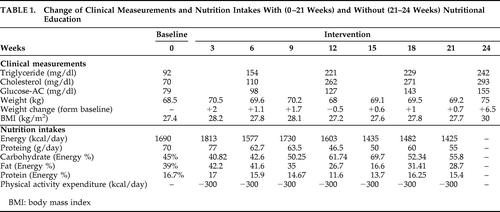Aripiprazole-Related Body-Weight Gain and Nutritional Counseling
Case Report
Miss A is a 41-year-old female outpatient who has had schizophrenia for 5–6 years. She was hospitalized once around 5 years ago and received quetiapine 400 mg/day with hypnotics regularly until 1 year ago. The antipsychotic was switched to aripiprazole 10 mg/day because of the persistent side effect of body weight gain (from 55 kg to about 68.5 kg within 5 years), probably related to quetiapine treatment. She started to receive nutritional counseling to prevent further body weight gain. The psychotic symptoms remained in control after switching to aripiprazole. The dietitian provided individualized nutritional counseling for weight control about 30–45 minutes twice per month. The counseling topics included low-fat diet, balanced diet, food-equivalent list, and the six food groups. During each visit, the dietitian assessed the practice of dietary plans for this patient. She also received an ongoing dietary record to monitor calorie-counting and increased physical activity and to reinforce the concepts of controlling the food component. Weight gain was minimal while receiving nutritional counseling but dramatically increased after quitting nutritional counseling. The metabolic profiles also deteriorated in 24 weeks (see Table 1).
 |
Discussion
Aripiprazole is believed to cause less body weight gain than other atypical antipsychotics. It could decrease the body weight and improve metabolic parameters of overweight patients treated with olanzapine.1 The relatively pure affinity for dopamine receptors might produce less weight gain.2 Its metabolic and cardiovascular complications were fewer than those of other atypical antipsychotics, such as olanzapine.3 Aripiprazole is also recommended as a therapeutic substitution for schizophrenic patients with cardiovascular complications related to atypical antipsychotics. However, Fava et al. found that adjunctive aripiprazole probably contributed to weight gain in patients with major depressive disorder.4 The 5-HT2C receptor is important for appetite and weight control. The authors suggested that potent serotonin 5-HT2C binding of aripiprazole2 might be related to weight gain and metabolic changes in this patient. The dietitian used the Harris-Benedict Equation5 to calculate the basic energy expenditure and subsequent caloric requirement for a body weight-control plan. The patient planned to lose weight by subtracting 500 kcal from her daily requirement, which should decrease weight 1–2 pounds per week. The dietary plan was according to the American Dietary Association guidelines for food, with protein around 15%–20%, fat: 25%–30%, and carbohydrates: 50%–60%. Her exercise habits should also reduce 2 kg of weight by increasing caloric consumption. However, her body weight gain persisted, with a dramatic increase after quitting diet counseling. From the above findings, we suggest that aripiprazole fails to produce weight loss, but nutritional counseling might be advantageous. The promotion of nutritional counseling for schizophrenic patients could be considered, even with those antipsychotics with lower risk for metabolic syndrome, such as aripiprazole.
1. : Aripiprazole added to overweight and obese olanzapine-treated schizophrenia patients. J Clin Psychopharmacol 2009; 29:165–169Crossref, Medline, Google Scholar
2. : Aripiprazole in the treatment of depressive and anxiety disorders: a review of current evidence. CNS Drugs 2008; 22:367–388Crossref, Medline, Google Scholar
3. : A comparison of weight change during treatment with olanzapine or aripiprazole: results from a randomized, double-blind study. J Clin Psychiatry 2004; 18:47–56Google Scholar
4. : Metabolic assessment of aripiprazole as adjunctive therapy in major depressive disorder: a pooled analysis of two studies. J Clin Psychopharmacol 2009; 29:362–367Crossref, Medline, Google Scholar
5. : Simplifying the calculation of body mass index for quick reference. J Am Diet Assoc 1990; 90:856Medline, Google Scholar



